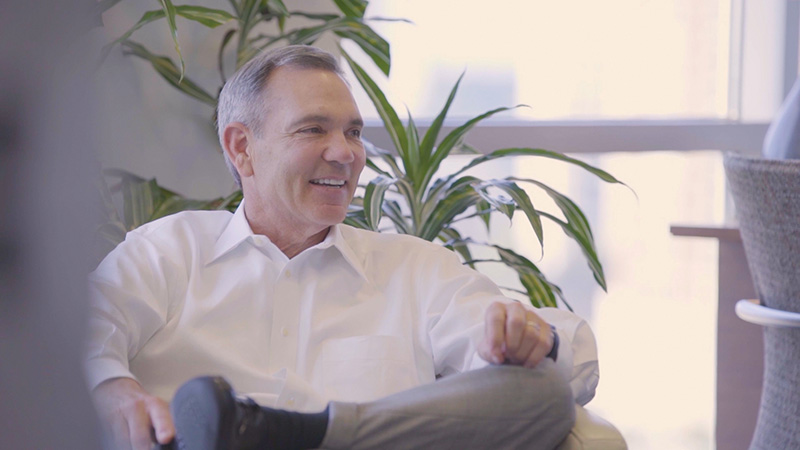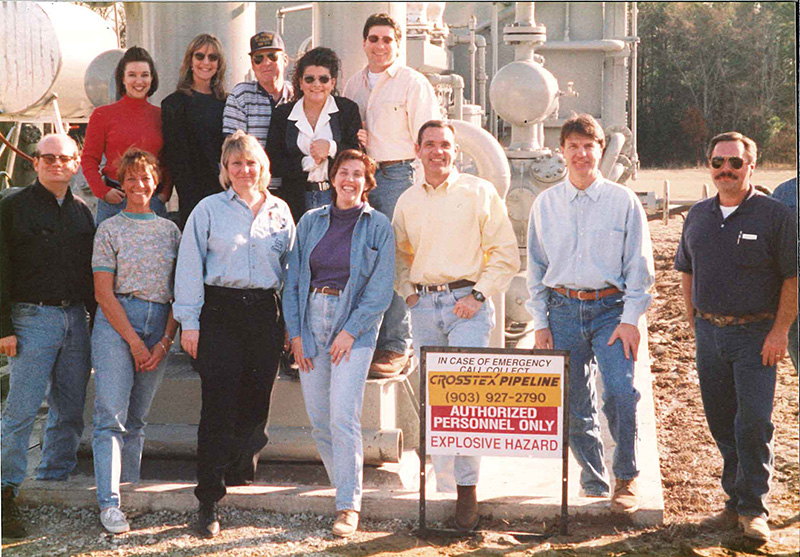August 2022, Vol. 249, No. 8
Features
Retiring EnLink Founder Davis Recounts Decades of Change
By Michael Reed, Editor-in-Chief
(P&GJ) — EnLink Midstream Chairman and CEO Barry E. Davis is stepping away from EnLink, the company he founded and led for more than 25 years.
Davis led EnLink’s predecessor, Crosstex Energy, from its founding in 1996 through the 2014 merger of Crosstex with midstream assets from Devon Energy, which created EnLink.
Under his leadership, EnLink evolved into a Fortune 500 integrated midstream company with a strong financial foundation and a diverse geographic footprint in several top U.S. basins, which is also pursuing innovative and sustainable energy transition opportunities, such as carbon capture and sequestration (CCS).
In this interview, Davis discusses what it takes to get a pipeline built today and how important he considers carbon capture efforts in the coming years. He also picks a couple of his favorite pipeline projects from his career.
P&GJ: Here’s a question you probably haven’t been asked for a while. What initially attracted you to the energy industry?
Barry Davis: I’ve always been a huge believer in mentor relationships, and one of the reasons is the impact that an early mentorship had in my life. My first real mentor was Van Nichols, who was about five years older than me. He approached me in high school and said he would like to help me. He graduated from Texas A&M and then went into the oil and gas industry, and I thought that might be the place to go. So that’s what I did when I graduated a few years later – I went into oil and gas.
P&GJ: What was your first job in the energy sector?
Barry Davis: Well, like my mentor, I entered the energy industry as a landman. Shortly thereafter, I moved to the midstream side of the industry, which at that time was just oil and gas marketing for a producer. From there, I was able to evolve with the midstream industry as it developed over the next several decades.
P&GJ: What are some of the biggest changes you’ve seen during your years in the energy industry?
Barry Davis: I would use the word “transformation,” which is not too dramatic of a term when talking about this industry. In fact, I might even use the word “creation,” because we’ve essentially created an industry during my tenure that has changed the industry.
It started in the mid-1980s when FERC [Federal Energy Regulatory Commission] order No. 436 was handed down and deregulation started to happen. We changed the way we marketed natural gas in five states. I entered the industry shortly after the order was imposed and have seen midstream basically go from nonexistent to a very large, robust industry over the last 40 years.
There have been lots of changes to get to where we are today, and it certainly has been an evolution that I’ve been very fortunate to be a part of.
P&GJ: Do you have a favorite pipeline project that you were involved in during your career? And if so, what would make that your favorite?
Barry Davis: Well, I actually have two favorites. The first was our first residue take-away pipeline in North Texas, which really marked the beginning of our significant involvement in the shale play.
We moved natural gas from the production source in the Barnett over to East Texas to multiple pipelines to take it on to market. That was a big step for us to be one of the first movers in the first shale play in the country.
The second favorite pipeline has had more significance to us in terms of what it has contributed and what it’s done for us strategically. That would be our Cajun-Sibon pipeline, which we built in 2012. It runs from Mont Belvieu to South Louisiana, and moves natural gas liquids into our fractionation facility, then into the industrial markets of the Gulf Coast.
P&GJ: How big of a transition was it for you when Crosstex Energy, which you founded, merged with midstream assets from Devon Energy to create EnLink Midstream?
Barry Davis: That was a huge step. It more than doubled our size and the EBITDA [earnings before interest, taxes, depreciation, and amortization] of our company. But from a transition standpoint, we kept doing what we were already doing.
The biggest contribution of assets made by Devon was in North Texas, in the Barnett shale, where we already had a very large position. Integrating those assets with our own assets was a fairly small transition for us.
The bigger transition was to have a large company, Devon, step into the way that we operated in terms of governance and ownership of the company. It was a very positive thing to work with the Devon team, and we certainly benefited greatly from the relationship over the years.
P&GJ: What do you see as the biggest barrier to getting pipelines built in North America?
Barry Davis: Well, the good news is we are getting pipelines built in North America. I’ve never seen any situation in my career where we couldn’t find a way to get things done. I’ve said it often, “Any space that we have seen, we have found a way to fill it.”
Most recently, we’ve had to deal with inefficiencies in permitting and now even greater inefficiencies in terms of the logistics of getting the people who we require to get things built. So, those are the two areas that I think we really could benefit from greater efficiencies: permitting and just getting the people and the resources needed to build infrastructure.
P&GJ: Do you think the federal infrastructure bill and President Biden’s push to supply gas to Europe will benefit the industry in the long run?
Barry Davis: We are beginning to see the greatest call on natural gas this country has ever seen. Not only for the supply to support Europe in all of the challenges that are going on there today, but also in this country as we move to a cleaner natural gas versus what has historically been a crude oil-driven industry.
Yes, I do believe that the push to help Europe, combined with our domestic demand, will create a great opportunity in this industry, which will require significant resources to explore or develop the natural gas reserves, as well as to build the infrastructure needed to move it to market.
P&GJ: Can you give us your thoughts on the emergence of carbon capture and its importance to the industry moving forward?
Barry Davis: I think carbon capture and sequestration is one of the greatest possibilities that we’ve seen in this industry during my career.
It has the potential to make a dramatic impact on the reduction in emissions associated with, not only what we do in this industry, but with all industries that emit carbon dioxide – we can capture and sequester the carbon emitted from industrial customers throughout the United States and globally, which is great news for the midstream industry and useful for all industries looking to reduce their impact.
Many believe that this is the answer to how the industry hits the target of net zero by 2050. And the good news is EnLink has a very strategic position with pipelines in the Gulf Coast of Louisiana. EnLink has significant redundancy of pipe that is usable for carbon capture and transportation. I think the company will play a significant role in one of the most important aspects of the energy transition.
There are many things that are going to happen in the energy transition, but carbon capture is the most immediate that we see on the horizon in the next decade or so.
P&GJ: Have you noticed a significant change in the midstream workforce since the beginning of your career? And to that point, is it more difficult to fill skilled positions now than it used to be?
Barry Davis: Like many industries, I believe the midstream industry is suffering from an aging workforce and a lack of skilled workers coming into the front end of the pipeline industry.
I think part of that reason is similar to the reason for many other challenges that we have in this industry — the world’s view of the future of all things concerning the oil and gas industry or fossil fuels. If we benefited from a more positive view, I believe more people would enter this industry in greater numbers and we could continue to develop the workforce that we need for the future. That’s where sustainability comes into play. We are in an industry that provides important resources that make life as we know it possible today and can be done very responsibly through the right companies, like EnLink. There’s a lot of opportunity here, too.
I am a believer that the energy transition is going to happen. I believe it will take many decades, and I think the transition will look different than what people thought five or 10 years ago. I think this industry will continue to have a huge role to play, and there are opportunities for people who are coming into the industry.
P&GJ: Do you think that the energy transition itself will help to improve the image of midstream once it starts taking hold a little bit more?
Barry Davis: Well, I think that is a major part of the energy transition. First of all, we need to do everything that we can do to decarbonize the industry. Also, we need to do everything that we can more efficiently, cleaner and with a less carbon-intensive footprint. So that’s number one: we have to do things better.
Secondly, we have to tell our story better to show that we are doing things better and to remind everyone of the positives that our industry does for life today. I do believe that midstream will be a big part of the energy transition.
P&GJ: What do you think you’ll miss most about your job once you’ve retired?
Barry Davis: I grew up as an athlete, and I had a coach who said that when athletes are through playing, they spend the rest of their lives looking for their next locker room.
Well, this has been a terrific locker room for 30 years of my career. These are the people who I spend the most time with, and they are what I’m going to miss most about the job. People with whom I’ve been through great times – the best of times – and the worst of times.
P&GJ: What do you look forward to the most in retirement?
Barry Davis: Having the opportunity to experience what is on the other side. I’ve spent many hours, like lots of people do, wondering and dreaming about the opportunity to do the things that the next season of life brings.
That’s what I look forward to. The reality of getting to be in this next season is something that I have thought a lot about, and I’m excited to see what’s next.







Comments